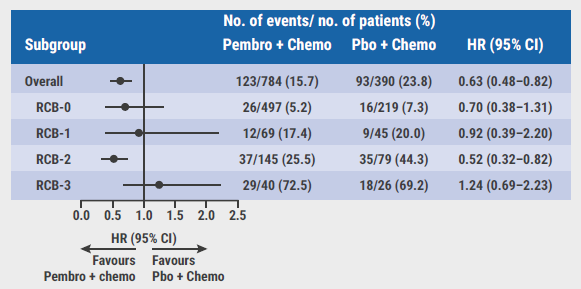https://doi.org/10.55788/78618bf3
The phase 3 ENZAMET trial (NCT02446405) randomised 1,125 patients with mHSPC to testosterone suppression plus standard NSAA therapy (control arm) or testosterone suppression plus enzalutamide (experimental arm). The administration of prior or concurrent docetaxel was allowed at investigator’s discretion. The first interim analysis of this trial, performed in 2019, displayed an OS benefit for patients in the enzalutamide arm, but not if these patients were planned to receive early docetaxel [1]. At ASCO 2022, Prof. Ian Davis (Monash University, Australia) presented the second interim analysis of this trial [2].
After a median follow-up of 68 months, the OS benefit of patients in the enzalutamide arm was maintained (median OS 73.2 months vs ‘not reached’; HR 0.70; P<0.0001, see Figure). In addition, the corresponding 5-year OS rates were 67% and 57%. Prof. Davis added that 76% of the patients in the control arm received enzalutamide or abiraterone after progression compared with 26% of the patients in the experimental arm. Prespecified subgroup analyses suggested that the OS benefits of enzalutamide were apparent across subgroups, but that patients with low-volume disease who were not planned for early docetaxel (55%) may benefit the most from enzalutamide. Importantly, a clear benefit of enzalutamide on top of testosterone suppression and docetaxel was observed in patients with synchronous de novo disease (n=362; HR 0.73; 95% CI 0.55–0.99). The study was however not powered for the subgroup analyses so these results should be interpreted with caution.
Figure: Overall survival outcomes of ENZAMET [2]

“Although enzalutamide was already used widely in patients with mHSPC, largely because of the results of the ENZAMET study, the current analysis provides more rationale for the use of enzalutamide after docetaxel or with concurrent docetaxel,” argued Prof. Russel Szmulewitz (University of Chicago, IL, USA), discussant of this presentation.
- Davis ID, et al. N Engl J Med. 2019;381(2):121–131.
- Davis ID, et al. Updated overall survival outcomes in ENZAMET (ANZUP 1304), an international, cooperative group trial of enzalutamide in metastatic hormone-sensitive prostate cancer (mHSPC). LBA5004, ASCO 2022 Annual Meeting, 3–7 June, Chicago, IL, USA.
Copyright ©2022 Medicom Medical Publishers
Posted on
Previous Article
« First results on distant metastasis-free survival in stage II melanoma Next Article
177Lu-PSMA-617 is a valid treatment option for PSMA-positive mCRPC »
« First results on distant metastasis-free survival in stage II melanoma Next Article
177Lu-PSMA-617 is a valid treatment option for PSMA-positive mCRPC »
Table of Contents: ASCO 2022
Featured articles
Breast Cancer
Sacituzumab govitecan meets primary endpoint
Shaky OS results of palbociclib in ER-positive/HER2-negative breast cancer
Practice-changing results of T-DXd in HER2-low breast cancer
SET2,3 to inform on chemotherapy decisions in ER-positive breast cancer
Metastasis-directed therapy fails in oligometastatic breast cancer
Analysis by residual cancer burden further clarifies effect of pembrolizumab
Contribution of metastatic therapies on mortality reduction in breast cancer
Radiotherapy may be omitted in breast cancer patients
Promising data for ribociclib after progression on ET plus CDK4/6 inhibitors in HR-positive/HER2-negative metastatic breast cancer
7-gene biosignature: Benefits of endocrine therapy and radiotherapy in breast cancer risk groups
Lung Cancer
Additional tiragolumab does not help patients with untreated small cell lung cancer
Success for serplulimab plus chemotherapy in small cell lung cancer
Adagrasib safe and clinically active in non-small cell lung cancer
Long-term benefits of combined immunotherapy over chemotherapy in non-small cell lung cancer
Effect of KRAS mutations and PD-L1 expression on therapy response in non-small cell lung cancer
Melanoma
First results on distant metastasis-free survival in stage II melanoma
Higher response rates for concurrent triple therapy versus sequential therapy in melanoma
Genitourinary Cancers
Exploratory treatment options fail in ccRCC
Adjuvant everolimus did not benefit high-risk renal cell carcinoma
Cabozantinib fails as first-line maintenance therapy in urothelial cancer
177Lu-PSMA-617 is a valid treatment option for PSMA-positive mCRPC
Enzalutamide performs well in metastatic hormone-sensitive prostate cancer
Haematologic Malignancies
Autologous stem cell transplantation plus RVd improves PFS in multiple myeloma
Novel first-line treatment option for mantle cell lymphoma
Promising results for novel CAR-T therapy in relapsed/refractory multiple myeloma
Gastrointestinal Cancers
Panitumumab beats bevacizumab in RAS wildtype left-sided metastatic colorectal cancer
Spectacular results for dostarlimab in mismatch repair deficient rectal cancer
Triplet chemotherapy beats doublet chemotherapy in colorectal cancer liver metastases
To resect or not to resect primary tumours in stage IV colon cancer?
Novel treatment option for KRAS wildtype pancreatic cancer
Gynaecological Cancers
Primary results of rucaparib in ovarian cancer
Trabectedin not superior to chemotherapy in recurrent epithelial ovarian cancer
Encouraging results of relacorilant in ovarian cancer
Miscellaneous Topics
Bacterial decolonisation effective against radiation dermatitis
New standard-of-care for cisplatin-ineligible locally advanced head and neck squamous cell carcinoma
Ifosfamide is likely to be the go-to therapy in recurrent Ewing sarcoma
Dabrafenib plus trametinib candidates for standard-of-care in BRAF V600-mutated paediatric low-grade glioma
© 2024 Medicom Medical Publishers. All rights reserved. Terms and Conditions | Privacy Policy


